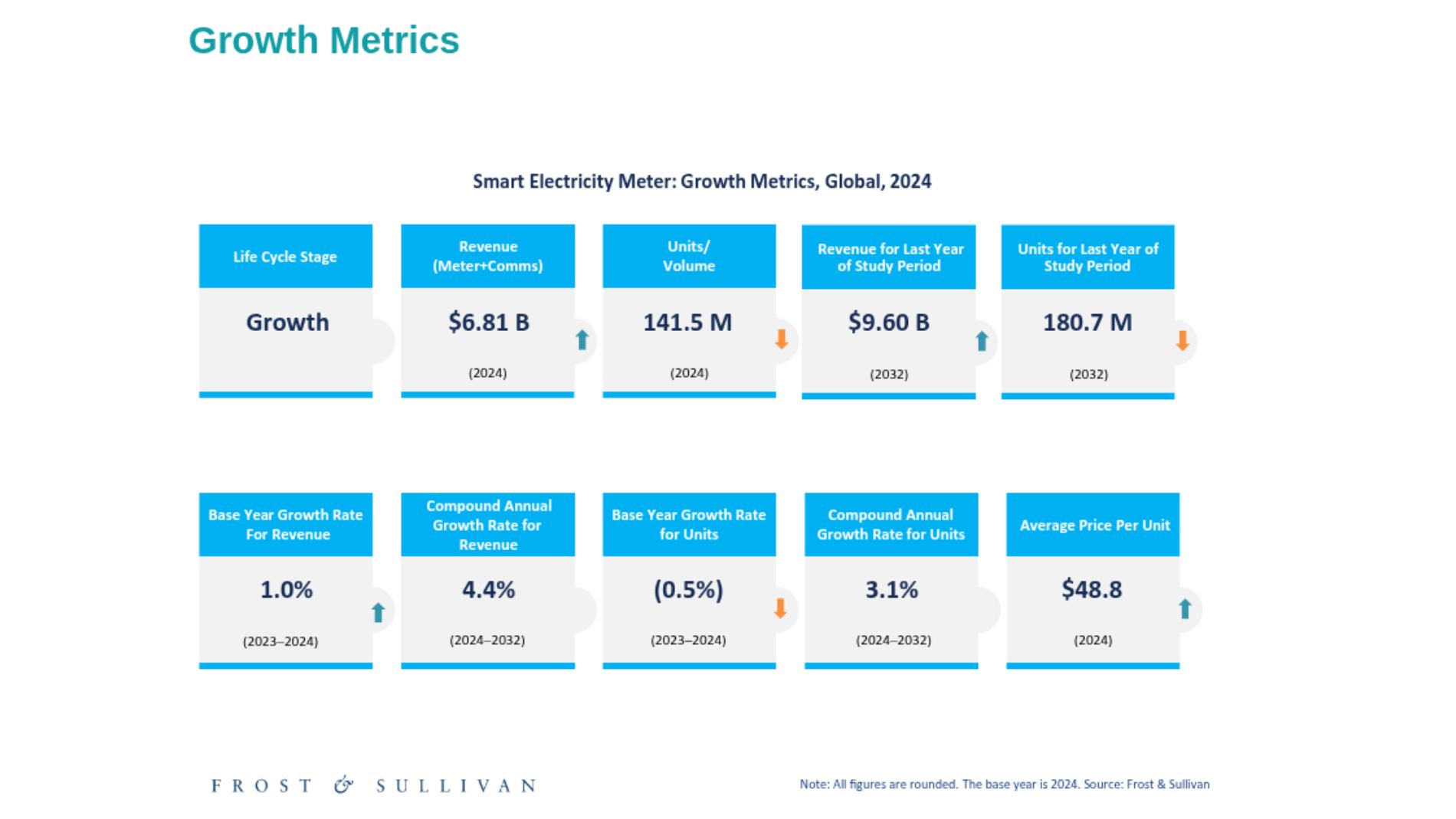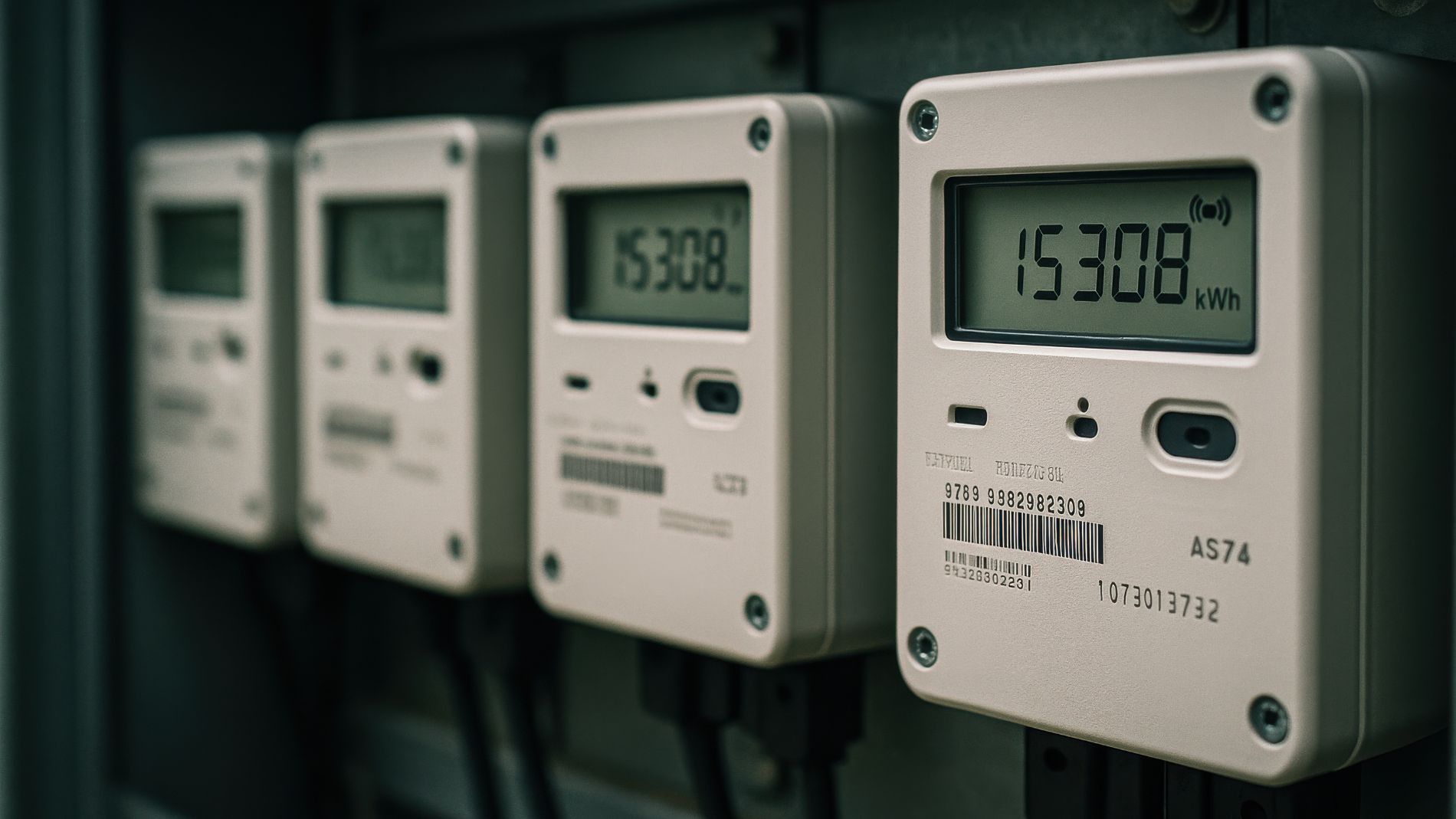Reading time: 3 minutes
New Business Models and AI Integration Transform Smart Metering Economics
Frost & Sullivan’s latest analysis finds that the global smart electricity metering market is poised for consistent expansion, driven by regulatory mandates, replacement cycles, and second-generation rollouts across key markets.
The study forecasts global smart meter shipments to rise from 141.5 million units in 2024 to 180.7 million units by 2032, representing a compound annual growth rate (CAGR) of 3.1%. Revenue is projected to grow from $6.8 billion to $9.6 billion during the same period, at a 4.4% CAGR.
A supportive regulatory environment remains the cornerstone of market expansion. While government mandates continue to drive large-scale deployments, utilities are increasingly motivated by the need to reduce non-technical losses, improve billing accuracy, and enhance grid performance. Following the resolution of supply chain disruptions and semiconductor shortages in 2023, the market has entered a new phase of stability and strategic transformation focused on long-term digitalization and sustainability goals.

Second-Generation Rollouts Reshape Mature Markets
Second-generation smart meter deployments are reshaping the landscape in mature regions such as Europe, North America, and East Asia. Early adopters including Italy, Sweden, and Finland have already transitioned to replacement cycles, while Denmark, Slovenia, and Spain are expected to follow later in the decade. In North America, large-scale replacement projects are set to accelerate from 2026, as utilities integrate grid-edge intelligence and enhanced data analytics. In East Asia, Japan and South Korea are moving rapidly toward second-generation upgrades, while the United Arab Emirates and other Gulf nations are preparing next-phase rollouts led by major utilities such as ADWEA and DEWA.
India Leads Global Volume Growth
Emerging markets will be the strongest growth engines through 2032. India leads the global transformation with its ambitious Smart Meter National Programme, targeting the replacement of 250 million conventional meters with smart devices. Large-scale rollouts supported by public-private partnerships are propelling India to the forefront of global smart meter adoption. Significant progress is also expected in Southeast Asia, the Middle East, Latin America, and Sub-Saharan Africa, where governments and utilities are increasingly adopting smart metering to combat power theft, improve efficiency, and modernize distribution infrastructure.
Evolving Technologies and Competitive Landscape
Technology advancements are transforming communication infrastructure, with RF Mesh, powerline communication, and NB-IoT/LTE Cat-M emerging as the dominant technologies. These systems enable real-time data exchange, grid optimization, and integration with distributed energy resources. Advanced cellular solutions, supported by 5G networks, are expected to play an increasingly important role in enhancing connectivity, reliability, and analytics capabilities.
The market remains competitive, with more than 110 active participants globally. Landis+Gyr retains its leadership position, followed by EDMI, Gridspertise, Itron, and Schneider Electric, while Indian and Chinese manufacturers such as Genus and Kaifa are expanding aggressively into international markets.
The industry continues to see consolidation as leading players pursue acquisitions and partnerships to strengthen their technology portfolios and expand regional reach.
Smart Metering as the Foundation of the Digital Energy Transition
Smart meters are evolving from basic measurement tools into intelligent devices central to the digital energy ecosystem. They now serve as key enablers of AI-driven grid analytics, demand response, and distributed energy management, supporting utilities in achieving decarbonization and resilience objectives. Service-based business models such as AMI-as-a-Service, Data-as-a-Service, and AI-as-a-Service are creating new revenue streams and operational efficiencies for utilities navigating digital transformation.
“Smart metering is no longer just about accurate billing- it has become the foundation for the digital energy revolution. As markets mature, the convergence of connectivity, intelligence, and renewable integration will redefine how utilities deliver value to customers while accelerating the global transition to net-zero energy systems.”
Download
The full report with detailed forecasts, innovation insights, and strategic recommendations is available for download.
- Smart Electricity Metering Industry (pdf, 1 MB)
Management Summary
Listen now: your management summary in audio format.











